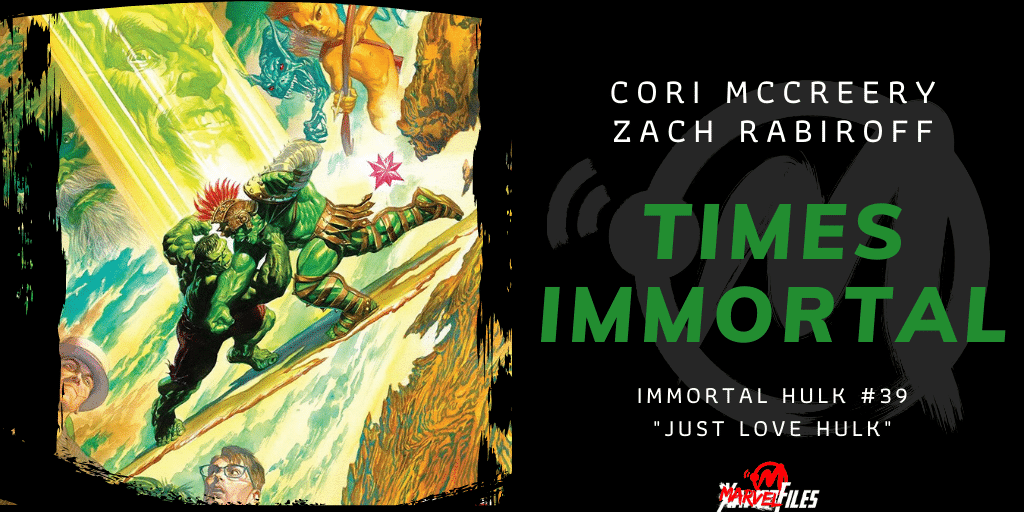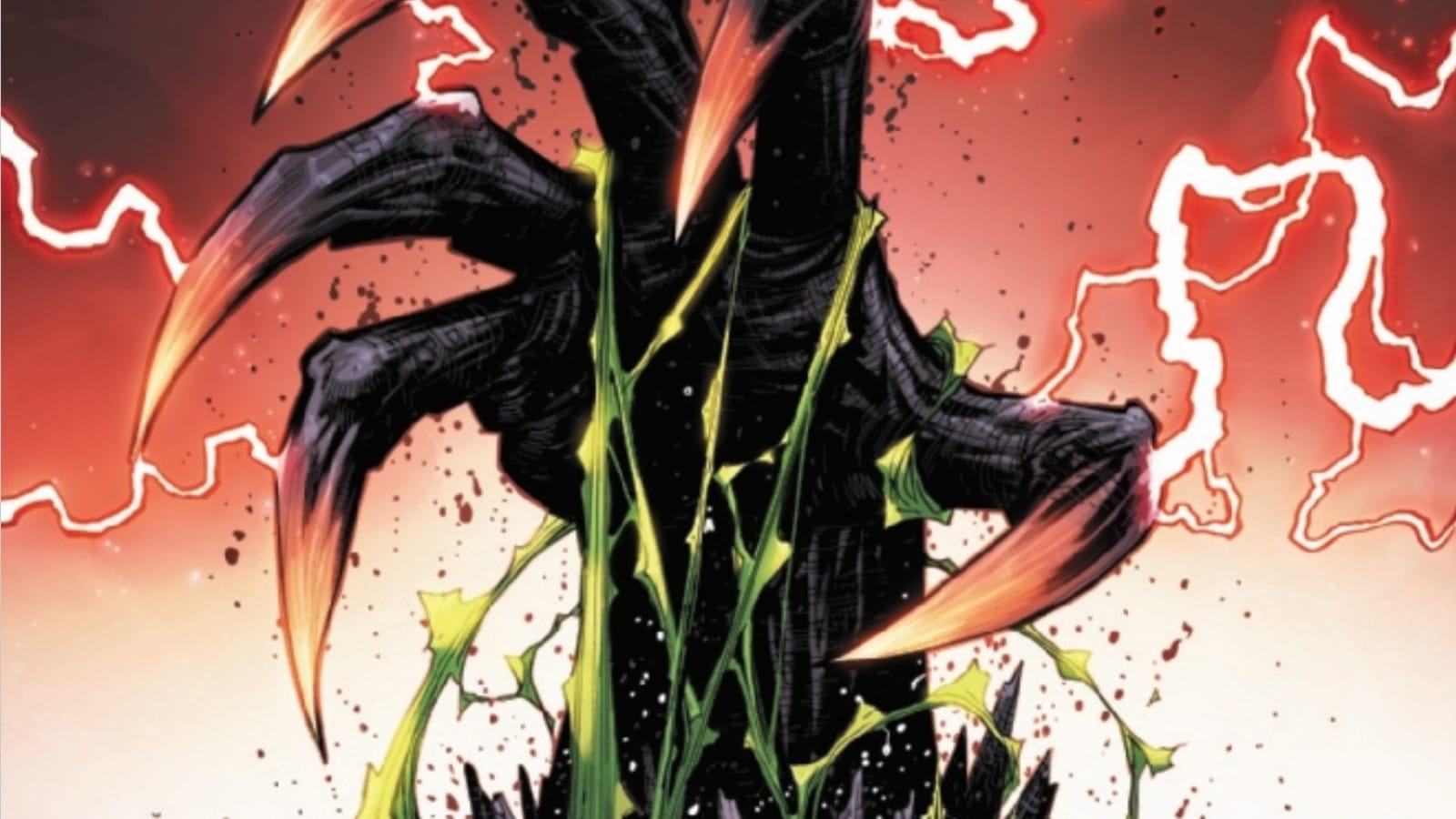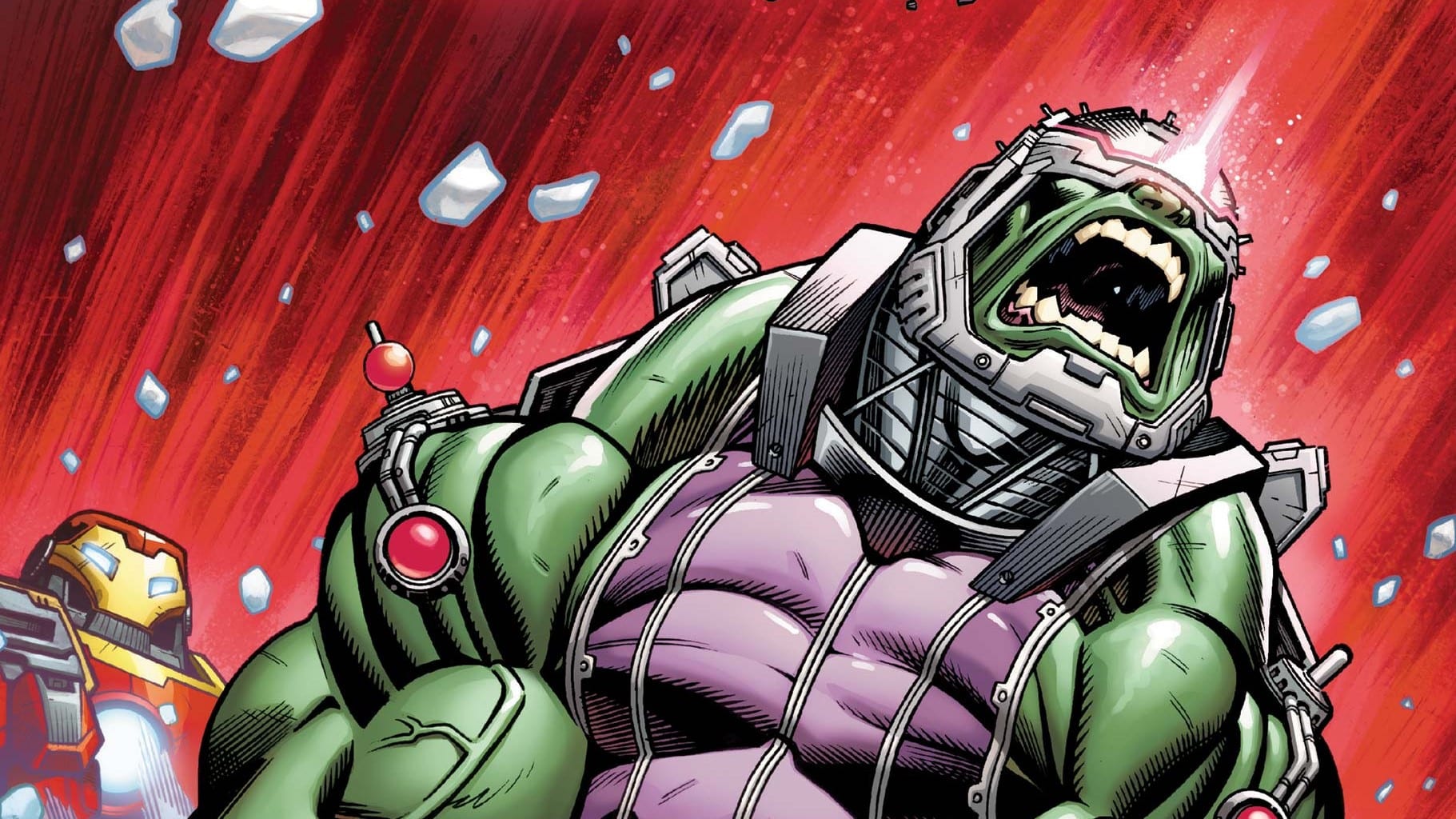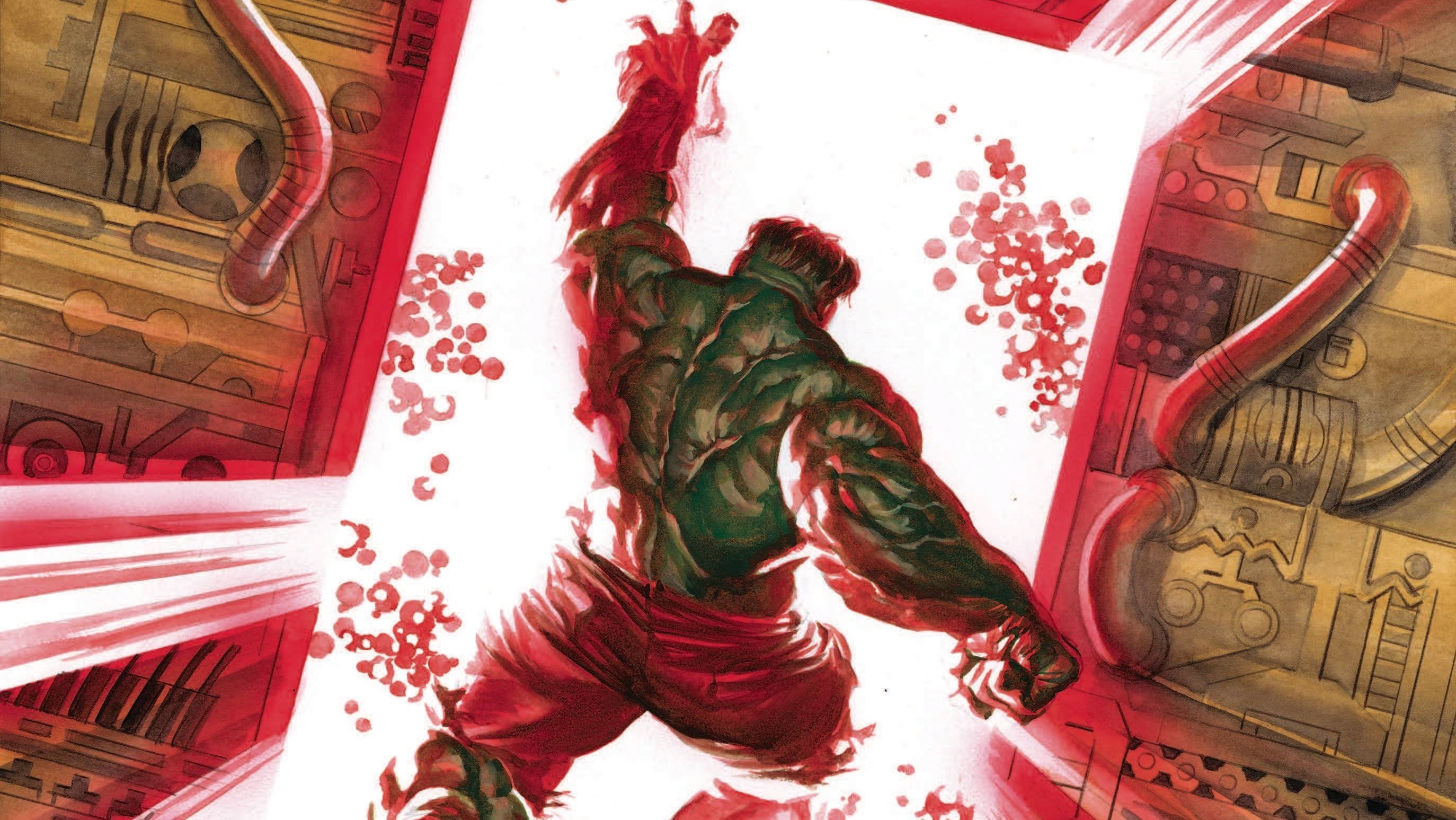The Leader faces off against the Devil Hulk and it’s winner-take-all in this issue written by Al Ewing, pencilled by Joe Bennett, inked by Ruy José and Belardino Brabo, colored by Paul Mounts, and lettered by VC’s Cory Petit.
Zach Rabiroff: [Lights up on a stage empty except for the snoring body of a bespectacled bald man. He blinks groggily, coughs to clear his throat, then gathers himself at the microphone.] Oh, uh, hi there. Welcome back. Hmm? Haha, no, no, of course I haven’t been sleeping here since last issue. That’d be weird! And I definitely haven’t been wearing all of Robert Secundus’s clothes since he took a temporary leave of absence from this column (but this shirt looks great, right?). Anyway, this is Times Immortal, where I’m still your temporary co-host Zach Rabiroff. It seems like we just left Bruce Banner at the mercy of the Leader, with a last-minute rescue possibly emerging in the form of our friend the Devil Hulk. This issue…well, this issue, things don’t go exactly as hoped. Cori, are you ready to venture beyond the Green Door again?
Cori McCreery: Truly, Zach, are any of us ever really ready? But mayhaps it is time, time for the sweet release of death.
Devil Dealers
ZR: We begin, as always, with the literary quotation that leads off the issue, and this time around it comes from Elizabethan playwright (and real-life English superspy) Christopher Marlowe, from his play The Tragical History of Doctor Faustus. In Act II of that play, Faustus finds himself confronted by personifications of the Seven Deadly Sins. And in this case, the speaker is Wrath, who warns him of the universal potential of any one of us to bring him into the world:
I was born in Hell, and look to it, for some of you shall be my father.
Dr. Faustus is, of course, the original dealer with the devil: a misguided, hubristic intellectual whose deal with a demon in the reckless pursuit of knowledge proves to be his own undoing. Ever since the days of Kirby and Lee, Bruce Banner has functioned as something of a Faust metaphor, with his creation of a deadly gamma weapon (even if it never exploded on him, someone was going to get hit with it) paying off with devastating consequences. But there are really no shortage of Fausts in this story, are there? In the opening scene, we watch as Brian Banner makes his own Faustian bargain with Samuel Sterns in order to get another shot at life. And Sterns, meanwhile, has made his own unholy deal with The One Below All. And let me tell you, Cori: if there is one thing horror fiction has taught me, it’s that you do not – you do not – seek to harness eldritch forces of unfathomable power and expect to come out in one piece. And yet, in the short run, it certainly seems like the Leader’s plans are working out for him so far. Which is actually not what I expected going into this issue, which in a lot of ways feels like a subversion of what we were set up to anticipate last time around. What do you make of all these chutzpah-sporting and devil-dealing men, Cori?
CM: You know the other shoe has to drop, and I know the other shoe has to drop, but really Ewing is not giving us any indication that this is true. Everything is coming up Millhouse Sterns right now, and it’s frankly unnerving. I see enough of the villains winning in real life, I’m not sure I want to see that in a comic I enjoy. And I know that his transformation to absorb Brian will draw comparisons to Xenomorphs… and rightfully so… but for me? It’s a flashback to my FIRST crossover event, the seminal 1993 DC Annuals event: Bloodlines. Freaky vampire tongue things have stuck with me for my whole life, and no sir, I don’t like it.
ZR: Oh, it’s absolutely full-on Xenomorph, and I guess Marvel really got back those Alien rights just in the nick of time. And really, the visuals in this issue are some of Bennett’s most gruesome in this entire series. The closing shot of Devil Hulk pared down to a sickly web of muscle and bone is the kind of thing that’s gonna linger. As we’ll see, this is a story about the breakdown of Bruce Banner’s psyche, but the art in this book is all about the chaos of the mind turned into chaos of the flesh. Hell tears these characters up from the inside out, and we just have to watch it happen.
CM: God, yes, that final page was just unsettling. It feels more floral body horror than most of the other things in the series, an almost rootlike growth from the corpse of the Devil Hulk. But even more terrifying is the page before, with those same rootlike growths shooting out of Banner’s eye sockets and replacing his forearms. Just completely and utterly sickening and frightful. Bennett is really doing the absolute best work of his career.
ZR: I totally agree, and it fits into the Faustian themes of this issue perfectly. On the subject of that quote, one other thought that might be worth mentioning: it’s actually interesting to see this warning of wrath as a dangerous, netherworldly force of harm, since last issue it seemed very much as though it might be Banner’s saving grace. Ever since he was a little kid, he’s depended on his rage as a source of protection from abuse, and rebellion against authorities who would seek to abuse others. Maybe it comes down to the difference between anger and wrath. The Hulk’s anger is a powerful force that can be (and in this series often has been) harnessed and used for good – and it makes me think of Steinbeck’s comment in The Grapes of Wrath that as long as people could still get angry, they knew things would be okay; it’s when the anger gives way to resignation and despair that they know it’s over. But wrath is just cruelty and bitterness for no purpose other than destruction: it’s Achilles slaughtering the Trojan armies, or Faustus torturing the Old Man of the play who represents Christian love. It’s a fine line, and stopping one from becoming the other depends on the Hulk knowing himself and his actions well enough to point his emotions at the right targets. And it looks to me like the Leader may have found a way to tip the balance.
CM: Yeah that difference is extremely important here, it needs to be something that can be harnessed, rather than something that is an uncontrollable force. And the power of that harnessed rage that you spoke of, is incredibly relevant both within the text of the book and within our current news cycle. It’s easy to give up and feel like your anger doesn’t matter, but that’s what the people in power want, so please don’t let them have it. They can take everything else, don’t let them take your hope and fury.
All Systems Down
ZR: This series has had a whole lot of disturbing scenes and gruesome images – heck, this issue alone is filled with some of the most nasty. But if I’m being honest, nothing has disturbed me more than the revelation of the Leader’s plan to break the Hulk by destroying his mental system. Banner, as we know, has struggled with cognitive and psychological issues for his entire life, and it’s only been in this series that we’ve seen him finally find a way of living with them. The Hulk system is not only the first time we’ve seen him embrace his whole self, in all its complexity and idiosyncrasy, but to find in it a source of comfort and stability. For five-plus publication decades, Banner has led a lonely, difficult, and frequently terrifying life, and finding this delicate balance in himself has been an all-too-rare source of peace. So of course, it couldn’t last. Not in a horror story, at any rate. Sterns has plotted, and succeeded, at wrenching away the only two things Bruce Banner ever found comfort in: his friends and his inner stability. Take those away, and he’s a frightened kid again, helpless in the face of things that are too big and too cruel to understand. That’s an intensely personal and terrifying loss, and I confess that it cut me to the quick. Hulk getting destroyed physically? It’s ugly, but I can watch it from a distance with a bag of popcorn. But this? This feels very, very real. I’ve never been the Hulk, but I’ve very definitely been Banner, and there but for the grace of the Leader go I.
CM: Man, this was absolutely visceral and devastating. The most devastating part though is just how Sterns preyed on this loneliness. By presenting him with the illusion of love, acceptance, and approval from his abusive father, Sterns pulled just at the exact right strings for Banner. The most crushing thing about it is that the Devil Hulk offers those things to Banner willingly and unconditionally, but because it’s the safe bet, Banner can’t take it. His psyche is too wounded, his ego too fragile and he must go after the unattainable instead. There’s a part of me that can relate to this. I’ve had a fraught and distant relationship with my mother my whole adult life, and yet, despite how horribly she treats me, I still find myself questing after her love and acceptance.
ZR: I felt just the same way: it was heartbreaking to watch the Devil Hulk’s helpless pleading as the childlike Hulk personality was reduced to powerlessness in the face of his father. And not even his father, but an enemy who stole that bully’s face, form, and thoughts. It takes me back to another sense of that Marlowe quote — the idea that fathers are a mutable thing, and the mantle can be passed from one person to another through the power of violence. It would have been incredibly comforting to see this story go the way it looked like it was going: for the Devil Hulk to stand up and say, at last, that he’s not going to be afraid or ashamed of his dad anymore, because (as he told young Banner last issue) a father that’s a tyrant and an abuser isn’t a father at all. But for all the wild superheroics in this series, it really is a human story. And in human stories, trauma doesn’t go away that easily. The Devil Hulk wants to fight. He wants to protect the kid he was born to save. But he can’t, not if the child won’t let him, and there’s a tragedy in that failure that I think helps explain the ongoing cycle of the Hulk’s life. Boy, what a gut-punch.
CM: Like even when the Leader gives child Hulk his “reward” it’s condescending and cruel. Whether it’s Sterns using Brian’s personality or just doing it on his own, it really just highlights an abusive paternal relationship in a way that is devastatingly real and raw.
Leadertoxxx/The One Below All
ZR: Going from the very personal to the extremely metaphysical, I’m fascinated by some of the hints we got in this issue about the nature and identity of The One Below All. Sterns speaks of him as “the one remaining presence in the multiverse.” But what does that mean? Is The One Below All a remnant of a universe that predates Jonathan Hickman’s multiversal obliteration in Secret Wars. Ewing has certainly played around with the idea of godlike universal forces surviving that catastrophe back in his Ultimates run a few years ago. But just as importantly, what does Sterns know, and how does he know it? Have his trips to death and back led him to a knowledge of previous universes that others don’t have (is he the Psycho-Pirate of Marvel’s own Crisis)? Does gamma radiation itself come from a universe before our own? (That idea actually has some basis in the 1990’s, when it turned out the Hulk’s radiation was a nexus to the Heroes Reborn universe, so file that away in your Stories Nobody Will Ever Mention Again folder.) I have no idea! But it feels like we’re getting closer to some really interesting answers, don’t you think?
CM: I think we have to be! I feel like the stuff with the Leader may be wrapping up in the next couple of issues, however that may wind up, and then one last arc where we actually get to see The One Below All as a final villain of the series. Perhaps it’s not Banner or Hulk that are going to be the Leader’s undoing, but the true ruler of this place. As you said before, Faustian bargains rarely work out for the person making them, and Brian’s certainly didn’t, so it makes sense that Stern’s wouldn’t either.
ZR: Well, all in all, I thought this was a strong, disturbing issue that threw me for a minor-grade loop that I probably should have expected in the first place. How will it all work out for the Leader and his schemes? Well, the title of the issue, drawn from another Marlowe quote from the same play, might give us a hint: “The stars move still, time runs, the clock will strike.” Those words are spoken as the time comes when the bad doctor finally has to give the devil his due. It looks like all the pieces are coming together right now, but time speeds on to its inevitable conclusion. And like you said: a Faustian bargain is a well-known phrase for a reason.
CM: There’s still eleven issues left for Ewing to throw more curveballs at us, and I expect at least a few. I’d like to say I hope to get some wood on one, but it’s all the more likely that I’ll just be caught looking.
Marvelous Musings
- For a guy who fought fascists in Franco’s Spain at the side of Wolverine, Puck is really turning out to be a difficult guy to like.
- Not that anyone asked, but in addition to being a playwright, Christopher Marlowe moonlit as a secret agent for Queen Elizabeth’s intelligence service, rooting out the supposed Catholic menace from continental Europe, and his death came under extremely suspicious circumstances during a gambling game gone wrong that was almost certainly a cloak and dagger murder. Honestly, biographies of this guy are better than his actual plays.
- So he was the Tom King of his era?
- #Faustuswasapsyop
- #FaustusInCrisis
But seriously the Bloodlines aliens scarred me before Xenomorphs







